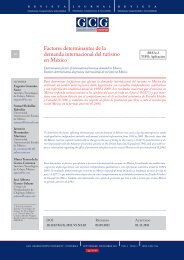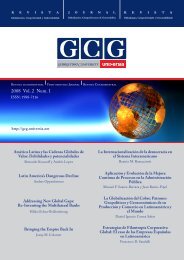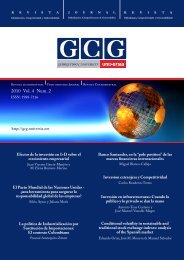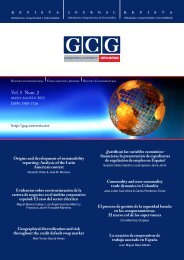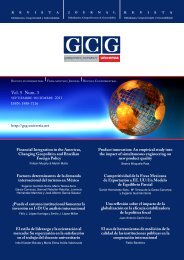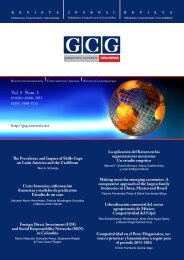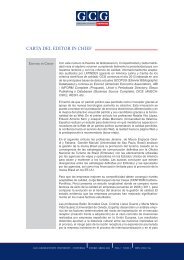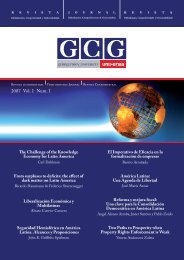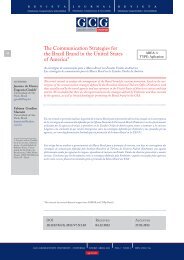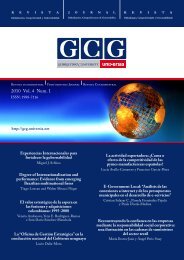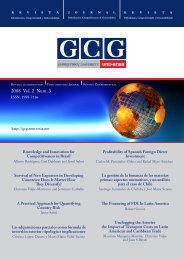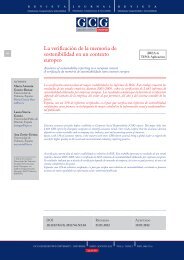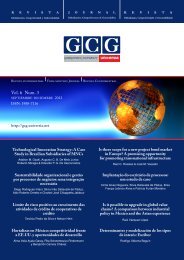Vol. 6 Num. 1 - GCG: Revista de Globalización, Competitividad y ...
Vol. 6 Num. 1 - GCG: Revista de Globalización, Competitividad y ...
Vol. 6 Num. 1 - GCG: Revista de Globalización, Competitividad y ...
Create successful ePaper yourself
Turn your PDF publications into a flip-book with our unique Google optimized e-Paper software.
Liu Yongtaoto threaten any third party’s interests (Zhang, 2007:48), and “it is not necessary or likely forChina to reduce U.S. influence in the West Hemisphere through elevating China-Latin Americanrelations” (Jiang, 2005:10).113In addition, with the increasing <strong>de</strong>velopment of China-Latin America relations, tra<strong>de</strong> frictionsemerge and “get prominent” (Sun and Zhang, 2007:71). One cause for the frictions, amongothers, is that China and the Latin American countries have similar export structures. Specifically,the low technology-valued products that China exports to Latin America, like textiles,clothes, and electronic gadgets, are similar to the products that Latin American countriesexport to China. Consequently there is competition for markets in Latin America, China, andpossibly other countries where they intend to export their goods. As one commenter puts it,China poses a challenge to Latin America “in terms of the strategy of economic <strong>de</strong>velopmentand the elevation of industrial structure” (Cao, 2005:75). To <strong>de</strong>al with the frictions, equal dialogues,friendly consultations, and related policymaking and readjustment are nee<strong>de</strong>d.The third challenge is the constant need for both Chinese and Latin American people to“<strong>de</strong>epen their mutual un<strong>de</strong>rstandings” of each other’s civilizations, cultures, political systems,and social values and beliefs (Zhang, 1994:41). As mentioned above, China and theLatin American countries are geographically and culturally distant. Progress has been ma<strong>de</strong>in cultural exchanges between China and Latin America in recent years, but much remains tobe done (Zhu and Liu, 2008:40). The lack of <strong>de</strong>ep and proper un<strong>de</strong>rstandings of each othermay give rise to negative effects on economic and political relations. Mutual un<strong>de</strong>rstandingis a long-term en<strong>de</strong>avor that can be achieved through various programs such as universitycourses on Chinese and Latin American languages, history, politics, economics, culture, anddiplomacy, and film, art, or music festivals organized through official and civil channels tohelp people on both si<strong>de</strong>s to know and appreciate each other.5. Concluding RemarksWith the process of globalization, the increasing <strong>de</strong>mand for national <strong>de</strong>velopment in bothChina and Latin America, and China’s foreign policy and strategy, China is <strong>de</strong>termined toembrace the international community and further involve itself in the process of global economicintegration. Accordingly, the overall relationship between China and Latin America isbound to expand in the 21 st century.In<strong>de</strong>ed, new progress has been ma<strong>de</strong> in China-Latin America relations in many ways, atvarious levels, and across a broad spectrum of areas in recent years. The two si<strong>de</strong>s haveenjoyed more frequently high-level exchanges, stronger political trust, closer cooperation inareas such as economy, tra<strong>de</strong>, science and technology, culture, and education, and mutualsupport and close coordination in international affairs. The friendly cooperation between thetwo si<strong>de</strong>s serves the fundamental interests of their peoples. Future growth of the relationshipenjoys great potential and broad prospects, and will contribute more significantly to peaceand the <strong>de</strong>velopment of mankind.<strong>GCG</strong> GEORGETOWN UNIVERSITY - UNIVERSIA ENERO-ABRIL 2012 VOL. 6 NUM. 1 ISSN: 1988-7116pp: 107-114



